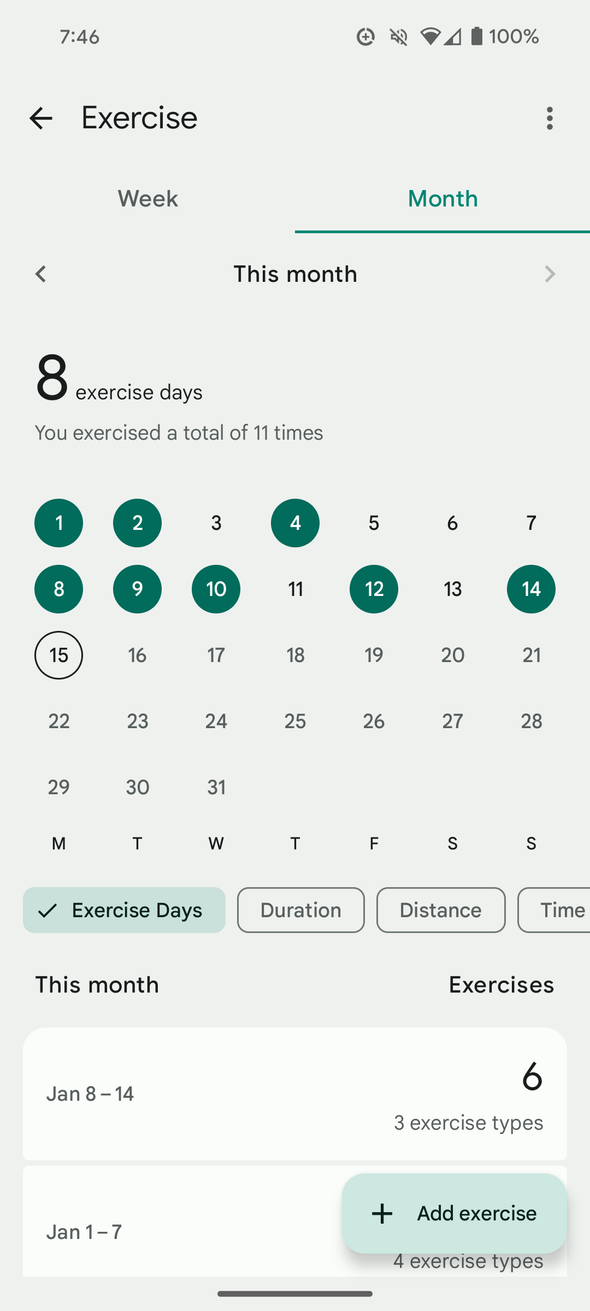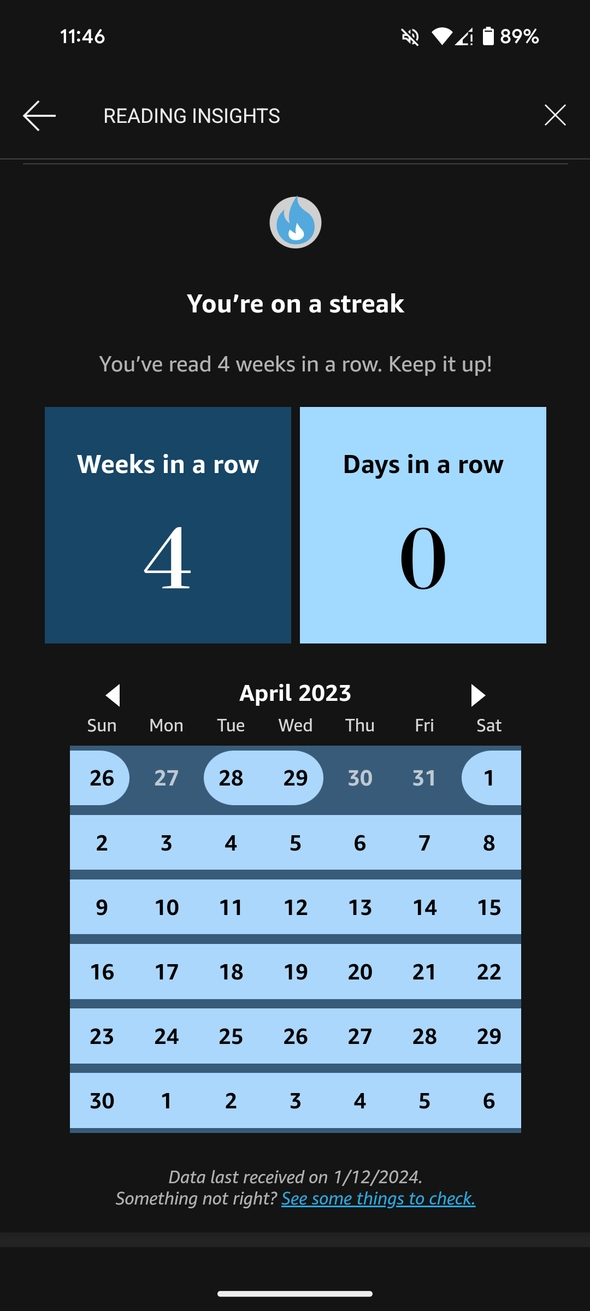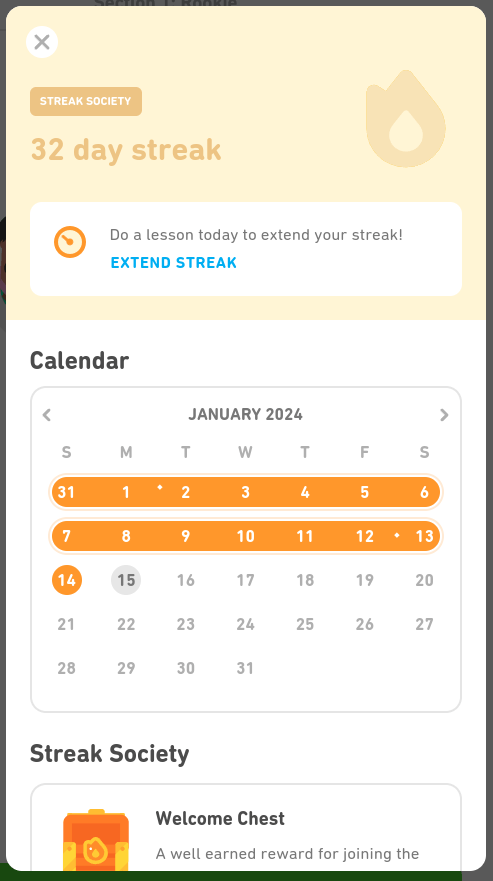Streaking into the new year
I've always been motivated by maintaining "streaks" of activities that align with my goals. However, I'm also terrible at consistently doing the same thing every day. Whether I have a daily or weekly goal, at some point I unintentionally break the streak. Sometimes it's because the goal becomes too difficult to keep up with every day, like Advent of Code, or because I collected another project or hobby that fully occupies my time.
As the new year rolled around, many stories of streaks being made or broken were hitting my newsfeed. One such story was detailed in Simon Willison's blog post, Tom Scott, and the formidable power of escalating streaks. YouTuber Tom Scott had successfully maintained a 10-year streak of weekly videos on his main channel. After reaching the 10-year milestone, he's decided to stop sticking to the weekly schedule, and is intentionally breaking his streak.
Willison sums up my exact feeling on streaks:
"In the past, I’ve tried my hand at strict streaks... and then found that 100 days in I miss a day, and suddenly I’m reset to zero and I lose all motivation to continue."1
The streak that I try to maintain that showcases this the most is exercise. I will be consistently exercising, filling up my Fitbit calendar with 5-6 days of exercise per week, and then I'll get sick or life will happen, and I'll stop exercising altogether for months. It can be so demotivating to have a streak like that broken. For example, I was exercising almost daily in August and September, but October broke the streak with a week out of town and subsequent illness. Then the holidays happened. I'm just now getting back to exercising five times per week, and I'm somehow eight pounds heavier.
At one point I had a great system where I put a sticker on a physical calendar if I worked out. It was a great reminder of how active I've been over the course of a month. However, I'm bad at updating those sorts of physical streak trackers. It's easier for me to have my metrics tracked automatically. I envy the bullet journal girlies. I tried to be one of you, I really did, but my personality does not jive with daily journaling.
One streak that I think would be cool to maintain is the GitHub streak, however, that will never happen. Almost all of my current commits are blog updates because my blog is hosted on GitHub Pages. Maybe if I created or was involved in some sort of large open source project it could happen, but I couldn't imagine additional daily commits on top of my daily closed-source work. (I know that you can post-date commits to fill out the grid, but that feels more like cheating than counting blog posts as code!)
The Kindle app has a streak tracker built-in, which is wonderful but also keeps you locked into the Kindle ecosystem. I spent the month of April maintaining a solid streak before breaking it at 39 days. Pretty regularly I would read a few pages of a Kindle book while sitting on the patio, but hotter weather drove me back inside to my library shortly into May. Since I'd rather be reading my physical books, the Kindle tracker is rarely accurate. (Also, I haven't been reading as much as I want lately.)
Of course, there's also the famous Duolingo streak. At one point, years ago, I had a 233-day streak, and I lost it all when I went on vacation. After that, it's been hard to rekindle my enthusiasm for Duolingo. I do have a 30+ day streak now, though. In the case of Duolingo, I have an actual goal to learn Japanese before visiting Japan sometime next year.
Having a definitive goal for completing a streak makes me much more motivated to maintain a streak and to also restart after losing the streak. For example, I'm expecting to use Japanese in the future, versus when I was learning Dutch just for fun. I'm much more motivated now since I might need to use the language in the near future.
Duolingo's goal is to help you learn a language with a minimal daily effort. This align's with Willison's take on maintaining streaks and seeing improvement.
"The best way to get really good at anything is to do that thing on a regular basis, thoughtfully, and with the goal of doing it slightly better every time."1
This is very similar to James Clear's approach of "tiny gains", or making a daily incremental increase that will, over time, become a large increase. This is one of my main approaches to self-improvement. The first step is showing up every day. The second is making a small but consequential improvement each day.
Fast Company's article on "The Duolingo effect" sums up how I often feel once I've established a streak.
"While streaks can compel behavior, they do not motivate all people for all situations. They can even have the opposite effect. Some people are turned off by the prospect of a streak because they’re concerned about being obligated to it, as reflected in the comments of a former streak runner: 'I realized that, if I let it, the streak could become a "thing" that controlled my life, my travel, and those around me.'"3
I'm always worried that once I've reached a milestone in my streak, that I will quit even harder once I accidentally break the streak. The last time I broke a Duolingo streak, I put the app aside for nearly a year. When I break exercise streaks, I tend to put off exercising again until I gain a significant amount of weight back. At one point I was trying to track a streak of intermittent fasting, and it became so demotivating that I had to completely delete the tracker app. Now I simply decide not to eat before noon or after 8 PM on weekdays, and if I slip, I don't berate myself over it. I will never try again to keep track of it, though. The gamification of eating habits is too slippery a slope for me, and would lead to depression and disordered eating.
In some cases, it's better to cultivate a habit instead of trying to maintain an unbroken streak of behaviors. A habit feels easier to restart, versus a streak that is over once it's broken. The stakes feel lower with a habit, although the behavior must be almost reflexive to qualify as a habit.
"Failing to perform a habitual behavior on occasion will have little impact on the likelihood of the person performing the behavior in the future. Conversely, failing to perform a behavior that is part of a streak ends the streak."
"For some people, ending a streak discouraged the behavior in the future: 'The streak is over. Why bother?' For others, it hardened their resolve: 'The streak is over. I’ve got to start another streak as soon as possible.'"3
I am not one of the "hardened resolve" people, but I am trying to change my mindset to become one. As James Clear puts it, getting off track happens, the problem is not resuming.
"I know that it's not a big deal if I make a mistake or slip up on a habit every now and then. It's the compound effect of never getting back on track that causes problems."2
I have a few goals for this year, and a few streaks that I'd like to achieve.
- Daily Duolingo practice - tracked by the Duolingo app.
- At least 5 days of exercise per week - tracked by Fitbit.
- Write three blog posts per week - tracked by, well, the number of blog posts I publish.
There are other things I want to achieve this year, but I feel like setting too many "streak" goals is detrimental. Even setting hard goals like reading a certain number of books can be demotivating if I begin to slip. Every year I set myself a goal to read 20 books (which should be so easy, right???), and every year I fail. I started so strong last year. However, some of the books I want to read are so big, they truly count as 3 or 4 books (looking at you, Code Complete, 2nd Edition). I also read a lot of newsletters and blogs instead of books. Once I start to fall behind on the grind, I lose motivation to continue. I'm setting myself a casual goal of reading a few pages of a book every day, but I'm not tracking this streak at all.
The previous three goals, though, I think are doable. If I end up missing a day or a week, I'm giving myself permission to get back on track and see if I can beat my previous streak record. Maybe that's the trick, to turn it into a game to see if I can beat my high score. The entire time, I'll be focused on doing a little bit better each time. Hopefully my blog writing will be better by the end of the year. Maybe I'll be in incredible shape. I look forward to looking back in 50 weeks to see what my progress has been.
- Simon Willison. Tom Scott, and the formidable power of escalating streaks. simonwillison.net.
- James Clear. This Coach Improved Every Tiny Thing by 1 Percent and Here's What Happened. jamesclear.com.
- Danny Weathers. The Duolingo effect: How keeping the ‘streak’ is changing people’s behavior. Fast Company.




